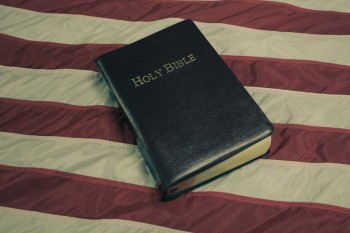The Story: A new poll reveals the theological beliefs of Americans about God, sin, salvation, heaven and hell, the church, and the Bible.

The Background: Ligonier Ministries teamed up with LifeWay Research, the research arm of the Southern Baptist Convention, for “The State of American Theology Study 2016,” a poll that gets at the theological beliefs of Americans.
The poll asked numerous questions on six key doctrinal areas: God, goodness and sin, salvation and religious texts, heaven and hell, the church, and authority. The project was designed, according to the authors, with a large sample to allow for comparisons between groups within Christian churches and those outside the Christian faith.
The Highlights:
Beliefs about God
More than half of Americans (66 percent) agree with the claim that God is a perfect being and cannot make a mistake (African Americans are the most likely to agree [86 percent] with this statement), and nearly as many (59 percent) agree that he knows everything that occurs in the world but does not determine all that happens (on this latter point fewer than half (49 percent) of Asian Americans agree).
More than half (66 percent) also agree that God continues to answer specific prayers. African Americans are again the most likely to agree (82 percent).
More than half (58 percent) agree that God is the author of Scripture (African-Americans are the most likely to agree [72 percent], followed by Hispanics [63 percent]).
A large majority (69 percent) agree there is one true God in three persons: God the Father, God the Son, and God the Holy Spirit. African Americans are the most likely to agree (84 percent), followed by Hispanics (74 percent).
More than half (66 percent) agree that God accepts the worship of all religions, including Christianity, Judaism, and Islam. Americans with evangelical beliefs are less likely to agree (48 percent v. 67 percent).
Beliefs about Goodness and Sin
More than half (65 percent) agree that everyone sins a little, but most people are good by nature. Americans with evangelical beliefs are less likely to agree (54 percent v. 68 percent).
A large majority (69 percent) agree with the claim that people have the ability to turn to God on their own initiative (only 9 percent strongly disagree).
A large majority (69 percent) disagree with the claim that even the smallest sin deserves eternal damnation. Even among Americans with evangelical beliefs only 47 percent agree with the claim.
More than half (52 percent) agree that by the good deeds that we do, we partly contribute to earning our place in heaven.
Beliefs about Salvation and Religious Texts
More than half (52 percent) agree the Bible alone is the written word of God. Almost all Americans with evangelical beliefs (95 percent) agree with the claim.
Roughly the same percentage of Americans agree (47 percent) as disagree (43 percent) with the claim that the Bible is 100 percent accurate in all that it teaches.
Roughly the same percentage of Americans agree (44 percent) as disagree (45 percent) with the claim that the Bible, like all sacred writings, contains helpful accounts of ancient myths but is not literally true. Asian Americans (51 percent), Hispanics (44 percent), and whites (47 percent) are more likely to agree than African Americans (31 percent).
More than two-thirds (76 percent) agree with the claim that an individual must contribute his or her own effort for personal salvation. African Americans are the most likely to agree (86 percent).
Beliefs about Heaven and Hell
More than half (60 percent) agree with the statement that heaven is a place where all people will ultimately be reunited with their loved ones.
Roughly the same percentage of Americans agree (40 percent) as disagree (44 percent) with the claim that hell is an eternal place of judgment where God sends all people who do not personally trust in Jesus Christ.
More than half (59 percent) agree that there will be a time when Jesus Christ returns to judge all the people who have lived.
Beliefs about the Church
More than half (59 percent) agree with the statement that worshiping alone or with one’s family is a valid replacement for regularly attending church.
Only 45 percent agree with the claim that churches that do not preach from the Bible should not be considered a Christian church.
Only 29 percent agree with the statement, “My local church has the authority to withhold the Lord’s Supper from me and exclude me from the fellowship of the church.”
More than half (54 percent) agree that the church should be silent on issues of politics.
More than half (65 percent) agree with the claim that God has authority over all people because he created human beings.
Beliefs about Authority
Exactly half (50 percent) agree that the Bible has the authority to tell us what we must do.
Less than half agree that abortion is a sin (49 percent) and that sex outside of traditional marriage is a sin (49 percent).
Almost half (42 percent) agree with the claim that the Bible’s condemnation of homosexual behavior doesn’t apply today.
Exactly half (50 percent) disagree with the claim that gender identity is a matter of choice.
Note: Over the next few weeks Ligonier Ministries will be posting articles interpreting the key findings of this survey. As they do, we’ll link to those in the Right Now section of TGC’s homepage.





